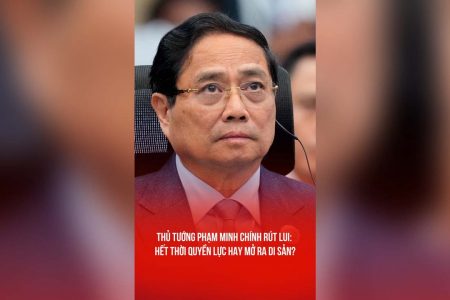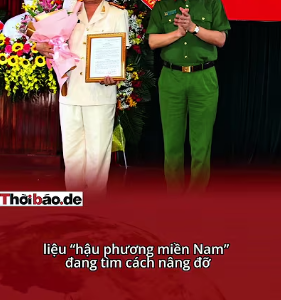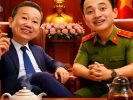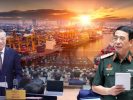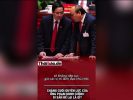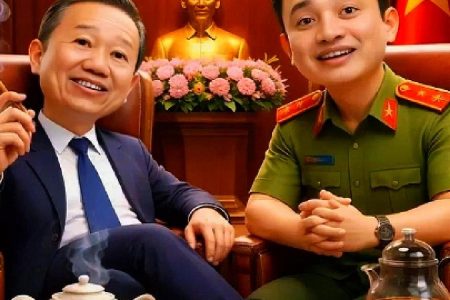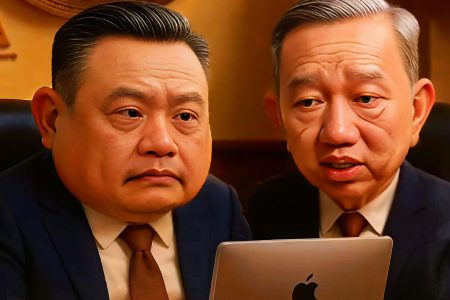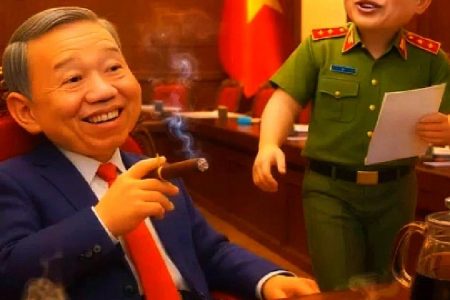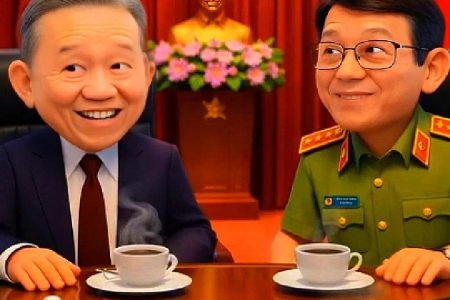
From the beginning of 2020, the outbreak of Coronavirus (or Covid-19) is a disaster for China. It is not only a microbiological and medical crisis, but also a crisis of Chinese political system, revealing their grave points. Vietnam is also plagued by „common destiny,“ even more dangerous because of the consequences of „Dong Tam syndrome“.
As of Feb 21, 76,000 people were reportedly infected in China and 2,236 have died. According to Vietnam’s Ministry of Health, there have been a total of 16 cases infected with Covid-19 in Vietnam. Vietnam has declared a medical emergency, and stopped all flights to / from China (but has yet to close the border).
After three decades of hot development, China as a giant rose to become an economic superpower, surpassing Japan and second only to the United States. But China did not „rise peacefully“ as the United States and the West expected, as the Chinese dragon cast its shadow on the East Sea (South China Sea), bullying its neighbors and monopolizing the sea as its own pond.
Xi Jinping sees an opportunity that has come so he abandons Deng Xiaoping’s „hide-and-wait“ policy, and consolidates personal dictatorial power (like the Mao period). At home, Xi suffocates democracy and freedom and implements a „social scoring system.“ Abroad, Xi implements the „Belt Road“ plan to manipulate countries with „debt traps.“
In response to the rising China, the US administration headed by President Donald Trump has adjusted its strategy, abandoning the previous government’s cooperation policies, turning to containment and confrontation as „new style of cold war.“ The US launched a trade war and used tariffs as economic weapons to weaken China in the Indo-Pacific region.
While China differentiates and manipulates ASEAN (such as the Philippines and Cambodia), other countries begin to respond (pushback) to the „Belt Road“ and „debt trap“ plans.
The US-Korea dialogue and the government change in Malaysia reflect the trend of Chinese escape. Recent fluctuations in Hong Kong and Taiwan are warning China.
It is the context of the great challenges that China faces as „misfortunes never come singly,” when the Corona outbreak occurred as „a very unfortunate disaster.“
In that volatile world, unpredictable variables threaten to expose the grave points of the political system. The outbreak and spread of Coronavirus caused many countries to boycott China as a criminal.
According to Minxin Pei, a professor of political science at Claremont McKenna University in the US, the „golden opportunity“ has been lost, China has not learned from the SARS pandemic (2002-2003) and failed to not cope with Coronavirus timely.
When the Coronavirus epidemic broke out in Wuhan, the local government was powerless and the city leader fled to the island, while 5 million people escaped from the city.
According to Professor Minxin Pei, Beijing is unable to handle such a pandemic. Since the SARS outbreak (2003), Beijing has not had any major innovation in crisis handling capacity.
Within a month (from mid-December 2019 to mid-January 2020) the vital period called the „golden window of opportunity“ was lost, when authorities interrogated and disciplined 8 doctors in Wuhan because „spread rumors.” During those weeks (until January 20), the number of people infected with the epidemic quickly doubled, startling the authorities.
The main reason is the „systematic error“ due to the dictatorial regime silencing information to manipulate and hide the truth. When a new outbreak was discovered in Wuhan (Dec 8) the government censored newspapers and websites (WeChat, Weibo), suppressed doctors and journalists. When someone died (Jan 11) the government denied that the disease could be spread from person to person.
As a result, the Corona outbreak has occurred and has now spread to 28 countries and territories around the world. After 5 million people have left Wuhan, it will be difficult to be controlled.
When the situation was endangered, with thousands of people infected and many dead (Jan 20), the government was forced to change its attitude and „drastically direct“ it but it was too late.
Often when government officials encounter a problem, they are often classified as „technical“ or „political.“ If it was politics, they would „kick the matter up to higher positions to wait for a decision.“
So in that highly centralized system, the decision making process is very long.
But when they decided, they behaved like wartime, which Professor Minxin Pei called „militarizing the government.“
The economic consequences of Coronavirus will be severe for China, as well as the countries that depend on them. After the Chinese New Year holiday, the Shanghai composite fell by 7.7%, and the Shenzhen Component Index fell by 8.5%.

When it can no longer be hushed up, there will be internal divisions. For the first time, the Corona outbreak challenges Xi’s power.
In economics, there is a subject of „political economy.“ But if one abuses to fully and completely politicize the civil sector (including health services) to maintain its monopoly, it will create congestion, like tumors in the national mechanism. When faced with a crisis like the SARS or Corona epidemics, that mechanism exposes its grave.
Although talking Chinese, the situation is the same in Vietnam, because it is „causal relationship.” Coronavirus further reveals the weaknesses of an inadequate and outdated political system.
Therefore, Mr. Tran Quoc Vuong is right to make a speech (Dec 25, 2019). “Whether the engine we built 75 years ago collapses or not, it would be only by us, not by the enemy. Nobody invaded us … nobody overthrows us. If we don’t do well, we will overthrow ourselves.”
In the current context, Vietnam’s ability to control and handle crisis is still weak due to its obsolete institutions and information censhorship.

At the Jan 30 meeting of the Government chaired by Prime Minister Nguyen Xuan Phuc, Deputy PM cum Foreign Minister Pham Binh Minh explained that the border closure was not due to “Vietnam-China treaty which states that if related to security and epidemics, it may be closed but there must be an agreement between the two sides, and Vietnam cannot unilaterally.”
Now the government’s urgent moves were late. After Tet, there are many crowded festivals, tourism industry and local authorities do not see all the risks. The health system of Vietnam is weak because of overload, which makes it difficult to cope with outbreaks.
In Vietnam, the Coronavirus outbreak occurred almost simultaneously with the Dong Tam incident and the country is facing „double crisis.“ Although the two events have different variables, they are essentially the same constant. These are two case studies that contain many unknowns that need further study to clarify.
Someone said in Corona shock, „the Dong Tam incident is almost forgotten“ and the EU-Vietnam Free Trade Agreement (EVFTA) approved by the European Parliament on Feb 11 is just like the story of another planet.“
That is to say, in logical form, to see Coronavirus more urgent, but actually it is „causality.“

Since the outbreak of COVID-19 pneumonia, the Chinese public has been following 2 issues: (1) Where did the virus come from? (2) Why is the CPC Central Committee’s prolonged guidance, missing out on the best opportunity to prevent and control the disease, which in turn leads to the disease going out of control?
In addition to prosecuting responsible people in Hubei, why not be prosecuted Xi Jinping? More and more frightening to the government is the fact that recently, there have been reports circulating on the Internet advising Mr. Xi Jinping to step down.
To have an answer for all, on Feby 15, Xi published an article titled, „Speech at the conference on dealing with Coronavirus pandemic of the Standing Politburo.” In this article, justified himself in coping with the disease.
Xi said, „After the outbreak of Covid-19 pneumonia, on Jan 7, I proposed a requirement for prevention and control of the pneumonia epidemic.
On January 20, I specifically approved the directive on disease prevention and control. On January 22, seeing that the disease was spreading rapidly, I explicitly requested that Hubei Province implement comprehensive management and control of the movement of people in and out the province.”
So why on Jan 11-17, Hubei still held important provincial festivals?
Why on Jan 18, Hubei Provincial Government still held a grand party of „Wanjia nest“ with over 40,000 households attending? Why on Jan 21, Hubei province leaders and the rest of the province watch the performance of the New Year together? Perhaps Hubei province intended to oppose the central government? Why is Beijing still held a New Year visiting delegation on Jan 23?
However, according to Apple Daily in Hong Kong, in its report on Jan 7, Xinhua did not mention the disease in Wuhan, and Xi Jinping’s speech was about other political issues, even when speaking to the delegation to visit the New Year on Jan 23, Xi did not have any word mentioning the „Wuhan epidemic.“
What makes Xi Jinping more difficult is that Wuhan Mayor Zhou Xianwang, in a CCTV interview on Jan 27 said: “On Dec 27, we discovered the first case, and at the same time there is a first report to the Beijing authorities, in a situation that has not been granted, Wuhan City has no right to declare the disease.”
The idea of Wuhan Mayor Zhou Xianwang is very clear: The responsibility to postpone the announcement of a disease is not local. China’s Central Radio also reported that Xi Jinping was „pushing responsibility.“

Since the outbreak of ‚Wuhan pneumonia‘ to date, the opposition to Chinese Communist Party leader Xi Jinping within the party has always been disruptive. If convened „political conferences“ in early March, not only the risk of spreading the disease, but the political situation is also likely to appear instability factor. This is the real reason for the „duality“ delaying.
At present, Xi is in a very dangerous situation, Xi needs to quickly launch political reform, throw away the burden of the CPC, should not continue to suppress human rights, return freedom of speech and freedom of belief for the people, so that China can restore its main society without the CPC.
7 years ago, Xi Jinping had three possible paths: the best policy is to conduct political reform; the medium policy is to maintain the guidelines of Jiang Zemin and Hu Jintao, the worse policy is to following Mao Zedong’s line, which is harmful to the people.
But Xi Jinping has repeatedly hesitated indecisive, ignoring the opportunity.
He claimed that maintaining the CPC’s dominance was protecting his power, but in the end the Chinese people were waiting for him to become the „guilty goat“ for the CPC, with a tragic outcome.
Hoang Lan from Ha Noi – Thoibao.de (Translated)



